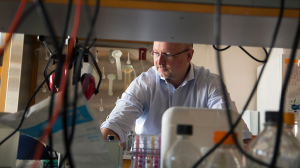Promising Results of Poliovirus Research Possible Thanks to Philanthropy
In a daring yet successful experiment back in 1995, Matthias Gromeier, MD, discovered that genetic recombination of poliovirus with a distant relative, human rhinovirus type 2, eliminates the disease-causing capacity of poliovirus. Yet, the modified virus retains the ability to infect and damage cancerous cells, owing to their abnormal “wiring,” and—more importantly—provides powerful immune stimulation by inducing host antiviral defenses.
This important work led to the development of poliovirus trials at Duke and other major academic institutions in the U.S. that continue to show promising results in patients with recurrent glioblastoma (brain tumors that return after standard of care surgery, chemo-and radiation therapy) and in patients with recurrent melanoma (skin cancers that are resistant to all available standard of care treatment).
In recent years, Gromeier, a professor in the Departments of Neurosurgery, Molecular Genetics and Microbiology, and Medicine, and his team have made major strides in improving care for brain tumor patients and for all patients suffering from solid tumors. They use technologies based on recombinant poliovirus that enable a patient’s immune system to recognize cancerous lesions and fight them by mounting antitumor immunity that exerts sustained cancer control.
Their most important lab discoveries in the past three years include elucidating principles of protein synthesis control that determine the ability of poliovirus to translate its genome in infected cancerous cells. Gromeier’s team has deciphered the host-innate antiviral response to tumor infection with the poliovirus, and the mechanisms of tumor antigen-specific antitumor immunity. They have also unraveled the mechanisms of the virus/host relationship of the modified poliovirus, enabling sublethal infection and proinflammatory activation of myeloid cells.
The team has achieved significant clinical milestones as well. A phase 1 clinical trial of the modified poliovirus in recurrent glioblastoma reported unprecedented durable radiographic responses and long-term survival. Cancer genome studies in patients treated with the poliovirus revealed that low tumor mutational burden correlates with response to immunotherapy.
The team has also expanded study of the modified poliovirus to other cancers. In a phase 1 clinical trial in recurrent, nonresectable melanoma, they reported promising findings of systemic antitumor immunity leading to complete pathologic responses in all tumors after intratumor injection of only one to three select cancerous lesions of the recombinant poliovirus in patients with multiple melanoma lesions.
“Collectively, our work is advancing a novel form of cancer immunotherapy that works in patients who are notoriously resistant to conventional immunotherapy, such as immune checkpoint inhibitors, and whose tumors recurred after surgery, chemotherapy, and radiation therapy,” Gromeier says. “While this research is spearheading the fight against brain tumors, and glioblastoma in particular, it is benefiting all cancer patients. The mechanistic principles underpinning the concept of cancer immunotherapy with recombinant poliovirus apply to all solid cancers.”
Gromeier credits philanthropy with their success. “Without philanthropic support, our pioneering lab research, our multi-pronged clinical strategy, and advancing our concept toward FDA approval would not be possible,” he says.



